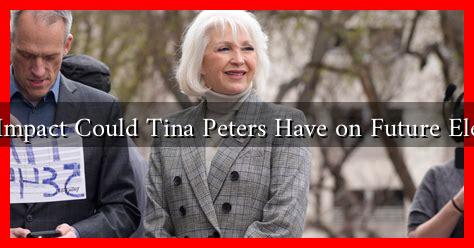-
Table of Contents
- What Impact Could Tina Peters Have on Future Elections?
- The Rise of Tina Peters: A Brief Overview
- Public Perception and Trust in Elections
- Policy Changes and Legislative Implications
- Case Studies: Similar Figures and Their Impact
- The Broader Implications for Electoral Integrity
- Conclusion: The Future of Elections in a Post-Peters Era
What Impact Could Tina Peters Have on Future Elections?
Tina Peters, the former Mesa County Clerk and Recorder in Colorado, has become a polarizing figure in the realm of election integrity and security. Her actions and the controversies surrounding her have sparked debates about election processes, trust in democracy, and the future of electoral politics in the United States. This article explores the potential impact Tina Peters could have on future elections, examining her influence on public perception, policy changes, and the broader implications for electoral integrity.
The Rise of Tina Peters: A Brief Overview
Tina Peters gained national attention after she was accused of allowing unauthorized access to voting machines in her county. Her claims of election fraud during the 2020 presidential election resonated with a segment of the population that remains skeptical of the electoral process. Peters has positioned herself as a champion of election integrity, advocating for transparency and accountability in voting systems.
Public Perception and Trust in Elections
The actions of figures like Tina Peters can significantly influence public perception of elections.
. Her claims have contributed to a growing distrust in the electoral process among certain voter demographics. This shift in perception can lead to several outcomes:
- Increased Skepticism: Peters’ assertions have fueled skepticism about the legitimacy of elections, particularly among her supporters. This skepticism can lead to lower voter turnout, as individuals may feel their votes do not matter.
- Polarization: The division between those who trust the electoral process and those who do not has deepened. This polarization can hinder bipartisan efforts to improve election security and integrity.
- Grassroots Movements: Peters has inspired grassroots movements advocating for election audits and reforms. These movements can mobilize voters and influence local and state elections.
Policy Changes and Legislative Implications
Peters’ influence extends beyond public perception; it could also lead to significant policy changes at various levels of government. Some potential implications include:
- Increased Audits: In response to claims of fraud, states may implement more rigorous auditing processes for elections. This could lead to increased costs and logistical challenges for election officials.
- Legislation on Voting Machines: Peters’ actions have prompted discussions about the security of voting machines. Lawmakers may push for stricter regulations and oversight of voting technology.
- Voter ID Laws: The push for stricter voter identification laws may gain momentum, as proponents argue that such measures enhance election security.
Case Studies: Similar Figures and Their Impact
To understand the potential impact of Tina Peters, it is helpful to examine similar figures in recent history. For instance, the influence of figures like Donald Trump on the Republican Party has reshaped its policies and voter base. Trump’s claims of election fraud have led to:
- State-Level Legislation: Numerous states have enacted laws aimed at tightening voting regulations, often citing the need for election integrity.
- Shift in Party Dynamics: The Republican Party has increasingly aligned itself with the rhetoric of election fraud, impacting candidate selection and campaign strategies.
These examples illustrate how a single figure can catalyze significant changes in political discourse and policy.
The Broader Implications for Electoral Integrity
The impact of Tina Peters on future elections may extend beyond immediate policy changes. The ongoing debates about election integrity could lead to:
- Increased Engagement: As citizens become more aware of election processes, there may be a rise in civic engagement and activism focused on ensuring fair elections.
- Long-Term Trust Issues: If skepticism about elections persists, it could undermine the foundational trust necessary for a functioning democracy.
- Potential for Reform: The controversies surrounding Peters may prompt lawmakers to consider comprehensive reforms aimed at restoring public confidence in elections.
Conclusion: The Future of Elections in a Post-Peters Era
Tina Peters’ actions and the controversies surrounding her have the potential to reshape the landscape of future elections in the United States. From influencing public perception and trust to prompting legislative changes, her impact could be profound. As the nation grapples with issues of election integrity, the lessons learned from Peters’ rise may serve as a catalyst for both reform and division. Ultimately, the future of elections will depend on how society addresses these challenges and seeks to restore faith in the democratic process.
For further reading on election integrity and related topics, you can visit Brennan Center for Justice.





